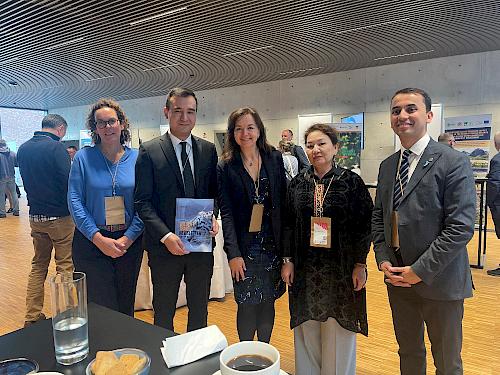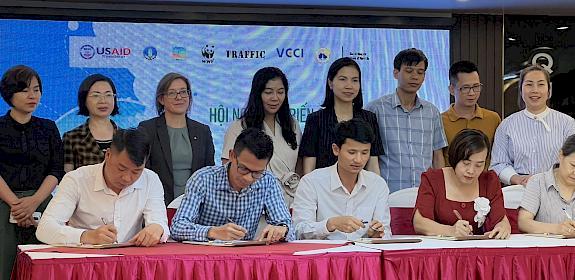TRAFFIC calls for increased attention to Central Asia's wildlife trade
Much of Central Asia’s wildlife is at threat from unsustainable and often illegal wildlife trade, while at the same time, there are major opportunities to grasp within sustainable, well-managed trade that will improve the lives of those living with wildlife. Relative to other regions, Central Asia has been overlooked historically. TRAFFIC’s Central Asia team, based in Kyrgyzstan, is seizing new, strategic opportunities to shine a spotlight on the region.
Central Asia is a unique region characterised by vast, open steppes, deserts, and high altitude mountain ranges. Spanning from China’s borders to the Caspian Sea, these countries are home to charismatic wildlife found nowhere else such as the Saiga Antelope, Snow Leopard, Pallas’s Cat, and the Central Asian Tortoise.
When it comes to illegal wildlife trade, conservation attention is often focused on major trade routes between Africa, Southeast Asia and China, with good reason. Meanwhile in Central Asia, illegal and unsustainable trade is putting both species and societies at risk – it can’t afford to be neglected.

TRAFFIC staff with Iskandar Kutbiddinov, Deputy Minister of Ecology, Environmental Protection and Climate Change of Uzbekistan, Shirin Karreya, IUCN Focal point for WCPA in Central Asia, and Jakhongir Talipov – Head of the Department of International Relations and Grants of the Ministry of Ecology, Environmental Protection and Climate Change, Republic of Uzbekistan.
On Monday, TRAFFIC hosted a side-event with the target of shining light on wildlife trade Central Asia at the IUCN Regional Conservation Forum for Europe, North, and Central Asia. Bakytbek Tokubek uulu, TRAFFIC Project Manager in Central Asia, presented an overview of wildlife trade in the region and examples of recent capacity building activities that TRAFFIC and its partners Fauna & Flora, Ekomaktab and ACBK have been implementing in the region.
The Central Asia region has long been overlooked within global efforts to tackle poaching, unsustainable and illegal wildlife trade. The recent recovery of the Saiga Antelope population in the region has demonstrated that conservation efforts can be effective and support recovery."
Bakytbek Tokubek uulu, TRAFFIC Project Manager, Central AsiaRecent TRAFFIC analysis of wildlife trade evaluated the situation in Kazakhstan, Kyrgyzstan, Tajikistan and Uzbekistan. The report identifies the four countries as significant importers of CITES-listed1 species, and Uzbekistan in particular as a prominent source country, for example for the Central Asian Tortoise.
While much of this trade is legal, illegal trade is a large concern; the horns of the Saiga Antelope and live specimens of the Central Asian Tortoises are among the most frequently reported species in seizures, as well as Ferula species (a herbaceous plant used in medicines), Goitered Gazelles, Siberian Ibex, Argali, and even the rare and elusive Snow Leopard.
Over the past two years, TRAFFIC and its partner organisations have worked closely with the governmental agencies to strengthen their efforts to address these issues. For example, the collection and reporting of poaching and illegal trade incidences, fostering more information exchange at national and regional level, and supporting law enforcement agencies with training and practical tools such as identification guides.
At the IUCN Regional Conservation Forum, TRAFFIC emphasised the relevance of combatting wildlife trafficking in the Central Asian Region and stressed how using wild resources sustainably and managed by communities can bring benefits to local communities.
One such resource that feeds local economies and is found in food, tea, and medicine throughout the world is liquorice. When managed well, the roots can bring essential income to local businesses and communities and can contribute to landscape conservation, but liquorice requires a long recovery time between harvests, and if this is mismanaged it can threaten the plant’s survival as well as make land susceptible to landslides and floods. TRAFFIC can offer recommendations to government and other organisations to manage this careful balance and ensure important trades such as this carry on into the future.
TRAFFIC and its partners are eager to support the Central Asian governments and others in their efforts address unsustainable and illegal trade in animals and plant species and thereby achieve more conservation successes."
Bakytbek Tokubek uulu, TRAFFIC Project Manager, Central Asia
To offer further support to CITES Authorities, law enforcement and other stakeholders, TRAFFIC has just launched the first edition of the CITES newsletter for Central Asia detailing the latest updates on successful wildlife trade seizures by the Central Asian countries, new tools, resources and events, such as new ID Guides and upcoming trainings for law enforcement officials. This newsletter is available in English and Russian and will be published twice a year to support the law enforcement agencies in the Central Asian countries and shine more light on this important region.
Read the newsletter in English Read the newsletter in Russian
Notes:
1 Convention on International Trade in Endangered Species of Wild Fauna and Flora
TRAFFIC is undertaking two significant projects in Central Asia, Strengthening Capacity and Fostering the Will to Combat Wildlife Crime in Central Asia and Understanding the dynamics and trends of the illicit trade in wildlife targeted for the pet trade in Central Asia, with funding from the United States Department of State Bureau of International Narcotics and Law Enforcement Affairs. TRAFFIC has also been funded by the UK Government through the Illegal Wildlife Trade Challenge Fund for capacity building work in the region.
About Bureau of International Narcotics and Law Enforcement Affairs (INL):

Funded by the United States Department of State Bureau of International Narcotics and Law Enforcement Affairs. The opinions, finds and conclusions stated herein are those of the authors and do not necessarily reflect those of the United States Department of State.
The mission of INL is to minimise the impact of international crime, such as money laundering and criminal gangs, and illegal drugs on the United States, its citizens, and partner nations by providing practical foreign assistance and fostering global cooperation. Visit the Bureau of International Narcotics and Law Enforcement Affairs (INL)'s website.
About The Illegal Wildlife Trade Challenge Fund

Funded by the UK Government through Illegal Wildlife Trade Challenge Fund.
The Illegal Wildlife Trade Challenge Fund is a UK government grants scheme that provides support to projects around the world that are tackling the illegal wildlife trade. IWT Challenge Fund
About Fauna & Flora

Fauna & Flora is a nature conservation charity protecting the diversity of life on Earth. For the survival of species and habitats, the planet and people.
As the world’s first international conservation charity, Fauna & Flora has been shaping best practice in community-focused conservation for over 120 years. Today, the charity works closely with local conservation partners in almost 50 countries to protect habitats, revive the ocean, reduce extinctions, stop illegal wildlife trade, combat climate change and influence global policy and corporate sustainability. www.fauna-flora.org
About Association for the Conservation of Biodiversity of Kazakhstan (ACBK)

The organization traces its history since 2004, working in the field of wildlife conservation. Today, the Association for the Conservation of Biodiversity of Kazakhstan (ACBK) has one office in Astana, one office in Almaty and nine branches throughout the country. The Ecological park "Alty Sai", that was created on the grounds of two hunting areas is managed by ACBK in the Kostanay region. There are 5 clubs of ACBK members and 53 employees. For more information visit www.acbk.kz
About Ecological Resource Center (EKOMAKTAB)

Ecological Resource Center (EKOMAKTAB) is a non-governmental non-profit organization and works in the field of environmental education, environmental protection and environmental safety. The Organization received official registration in 2005, and in 2015 it was re-registered and once again confirmed its commitment to the chosen area of activity. During the period of active activity, the EKOMAKTAB team has completed more than 30 projects that are important for the population and the surrounding nature. The leader of the environmental organization is Shivaldova Natalia Sergeevna. For more information visit www.ekomaktab.uz





